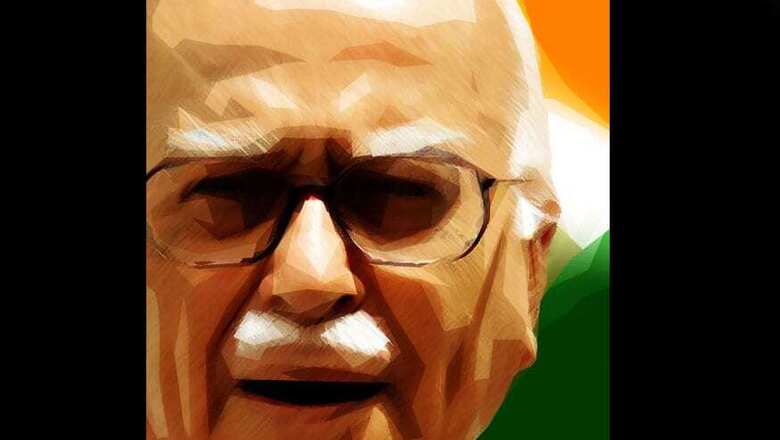
views
 These days, Lal Krishna Advani is quite selective in accepting invites for public and private functions alike. So, at a wedding ceremony last week in New Delhi, it was a pleasant surprise for a Congress leader to run into the former deputy prime minister.
These days, Lal Krishna Advani is quite selective in accepting invites for public and private functions alike. So, at a wedding ceremony last week in New Delhi, it was a pleasant surprise for a Congress leader to run into the former deputy prime minister.
Advani greeted him with his trademark namaste. The Congress leader, a former parliamentary affairs minister, exchanged pleasantries with the veteran parliamentarian.
“Advaniji, I must complement you for your neutrality,” the leader told the man whom BJP cadre once referred to as the Loh Purush (iron man).
He continued: “You were as upset with your minister for the Parliament logjam as you were with me many years ago when I was handling the ministry. Even then you would ask me repeatedly why the House was not functioning.”
Advani smiled politely. The conversation ended there.
These days, when Parliament is in session, Advani reaches the Parliament Complex at sharp 10.30 am, donning his navy-blue cap to brave the Delhi winter. Sometimes he arrives even earlier if the BJP parliamentary party is to hold its weekly meeting. Every day, five minutes to 11 am, he would take a short stroll from his room on the ground floor to the Lok Sabha chamber.
That’s a far cry from the days when he would be accompanied by a host of leaders and MPs. Now, as he ambles down the corridors and House lobby, passers-by, out of respect, make way. Ministers, MPs do a quick namaste and move on.
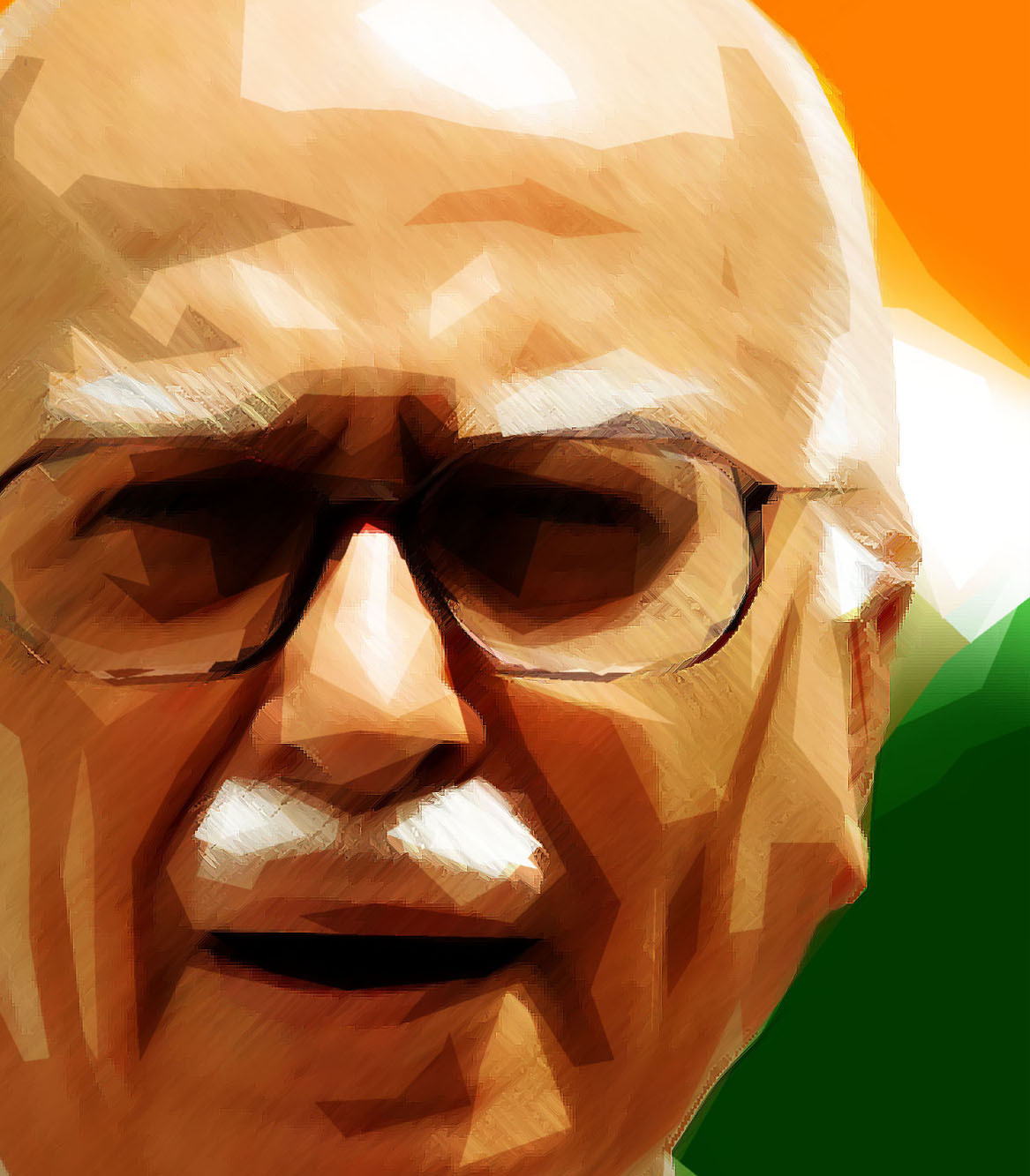
Advani, once Atal Bihari Vajpayee’s shadow, has today been relegated to the BJP’s Margdarshak Mandal. (News18)
He sits quietly in the House amidst the ruckus that has of late become a characteristic of both the Lok Sabha and the Rajya Sabha. When the proceedings are adjourned midway, inevitably every single day, Advani returns to his room quietly.
However, last Wednesday, he decided to digress from this routine. Just as the House was adjourned, he turned around and looked at his one-time protege and now Parliamentary Affairs Minister, Ananth Kumar.
“Neither the Parliamentary Affairs Minister nor the Speaker is being able to run the House,” a visibly upset Advani was heard telling the minister.
When he was told that the media in the press gallery was hearing all that was being said, he retorted that he will go public with the statement.
Then Advani asked a Lok Sabha secretarial staff till what time the House had been adjourned.
“Till 2 pm sir,” replied the officer.
“Why don’t you adjourn it sine die,” he said to no one in particular and walked back to his room.
The scene played out again a few days later. This was the penultimate day of the Winter Session. Any chance of a last-minute rapprochement between the BJP and the Opposition looked bleak. Both Opposition and Treasury Benches had dug in their heels over demonetisation. The House had been adjourned. Advani was sitting in his chamber. His daughter, Pratibha, had accompanied him to Parliament House that day.
“Sometimes I feel like quitting, but then I think what effect it will have... It will just become news story for one day,” Advani told a small group of reporters, including this correspondent.
Five minutes to noon, he left the chamber and walked down to the House. As usual, there was ruckus and the House was adjourned.
An MP asked him when the Parliament Committee on Ethics would meet — the octogenarian leader heads the panel.
“Let the House meet for a full day, and we will hold the meeting of the committee,” he said.
Trinamool Congress MP Idrish Ali joined in the conversation and asked how Vajpayee was doing.
“I feel like resigning. Vajpayeeji would have been a very sad man witnessing all this in Parliament,” he told Ali.
It's not the first time that Advani had decided to put in his papers. The first instance dates back to 1996.
Charged by the CBI in the Jain Hawala case, Advani quit from the Lok Sabha, vowing not to enter Parliament till he was cleared of all charges.
Advani’s stand, and his views on probity in public life, cemented his position both within the BJP and among the masses.
The second resignation came almost a decade later, under entirely different circumstances.
After the shock defeat in 2004 general elections, and attempting to reinvent and de-hyphenate from the Vajpayee-Advani binary, the RSS poster boy travelled to Karachi, the port city and the capital of Sindh, from where his family migrated to Gujarat after Partition.
All hell broke loose back home with BJP and RSS leaders scurrying for cover. The frontman of hardline Hindutva had endorsed the cobbler of the two-nation theory. Advani got the warning in Karachi itself that maybe a new New Delhi was awaiting him in India.
On board the return flight, he confided in a journalist who had travelled with him to Pakistan to cover the visit.
“He was upset. He was visibly hurt. He felt he had been misunderstood. And he told me he would resign on his return to Delhi,” the journalist, who now works with Network18, recalled.
Facing a barrage of criticism from both the RSS and a section within his party, Advani quit as BJP’s national president on June 7, 2005.
He withdrew his resignation after four days of intense parleys. But a few months later, he finally announced his decision to hand over the baton of party chief.
Advani’s last presidential address at the BJP national executive in Chennai in September 2005 explains the centrifugal tensions generated in the metamorphism of a cadre-based party to a mass-base party.
For students of political history, Advani’s speech is historic in its articulation of the relationship between the BJP and the RSS.
“The BJP greatly appreciates the continuing interactions we have been having with the RSS and with other organisations in the Sangh Parivar. Their views provide valuable inputs for our decision-making process but the BJP as a political party is accountable to the people; its performance has been periodically put to test in elections. So in a democratic, multi-party polity, an ideologically driven party like the BJP has to function in a manner that enables it to keep its basic ideological stances intact and, at the same time, expand itself to reach the large section of people outside the layers of all ideology. It is in protecting ideological moorings of the BJP and in articulating it in an idiom and language that the people understand that great care is needed,” Advani told the Chennai conclave.
The year marked the end of the third and final innings of Advani as the BJP president.
Incidentally, that very year, CPM general secretary and chief architect of the UPA, Harkishan Singh Surjeet, visited Karachi. Though Surjeet went to Pakistan a few months before Advani, he managed to keep his tour completely out of the media spotlight.
So what’s behind the latest threat of resignation by the leader who is still venerated by his party and cadre?
Opinions vary. It is a tad difficult these days to get BJP MPs to give a quote on Advani.
Those who respond attempt to downplay issues raised by the BJP founding member.
Information and Broadcasting Minister Venkaiah Naidu’s statement just after resignation talk sums it all up. Speaking to reporters in Parliament, Naidu said: “Everyone is saddened by how they are disrupting Parliament. The whole country is sad due to this reason. Who has been ranting slogans and disturbing from the beginning is clear to everyone."
"He (Advani) being a senior has rightly been hurt by developments," Naidu said.
To add a dash of bizarre to the very serious goings-on, there are at least a few BJP MPs in the Lok Sabha who believe Advani’s outburst is less political and more circumstantial. The problem, they say, are the 32 MPs of the Trinamool Congress.
The party has been vociferous — quite literally — in its fight against demonetisation. All through the session, the party MPs have been quite innovative in articulating their dissent both inside and outside the House. At times, even resorting to hulhuli, the customary Bengali ululating sound to ward off evil spirits.
Whether Advani’s outburst was spontaneous or well-thought out, it has lifted the spirit of the Opposition benches.
“Thank you Advaniji for fighting for democratic values within your party," tweeted Gandhi, who had earlier accused Prime Minister Narendra Modi of being "autocratic".
Well, Advani knows only too well about intra-party democracy. He also knows that the worst snub one can receive in politics is not a rebuke. It is that feeling of not being of any consequence anymore.
BJP watchers had to wait for a year more to see the first salvo from the old brigade. Last year, the fireworks in the BJP started a few days ahead of Diwali, precisely on November 11, just after the party’s crushing defeat in Bihar assembly polls despite deploying its full might in the state.
The joint statement by veterans Advani, Joshi, Shanta Kumar and Yashwant Sinha called for a thorough review of the way “the party was being forced to kow-tow a handful”.
The two back-to-back defeats — Delhi and then Bihar — were perhaps the ideal launching pad for BJP’s Margdarshak Mandal to strike back. Relegated to the margins, the four leaders pinned the loss on “emasculation” under the current dispensation.
The dispensation just shrugged it off. It just ignored it.
Amit Shah got another term as the party president two months later. The party prepared for the next electoral battle; registered an emphatic victory in Assam, got the electoral reprieve and moved on.
Ever since, the seniors have maintained a studied silence.
For Advani, all this is a far cry from the decades when he moved along the shadow of Vajpayee. Atalji reigned supreme, but there was a certain parity there.
“In running the affairs of the BJP, he had absolute and total freedom,” an RSS pracharak, who once worked very closely with Advani, told this reporter a few years ago.
“In fact there was an unwritten agreement between Vajpayee and Advani that in organisational affairs Vajpayee would seldom interfere. But when there was difference in opinion, Vajpayee would prevail,” he added.
This jodi or arrangement worked well for a long-long time. So well that from two MPs in 1984, BJP became the single-largest party in the Lok Sabha and led a successful coalition government at the Centre.
“At the BJP plenary in Mumbai, in 1995,” recalled the pracharak, “to everyone’s surprise Advani announced Vajpayee would be party’s PM candidate in the ensuing elections.”
Advani was the embodiment of tyaag, which conjoined with tapasya is ultimate elixir for the masses in the Indian polity. He was the eternal yatri, who took BJP and its ideology to every nook-and-corner of the country. He was the mentor, under whom the second-generation leadership flourished. He resuscitated the sagging morale of the cadre and told them never to be apologetic about BJP’s ideological moorings.
For instance, the phrase 'pseudo-secular', which was the common refrain in BJP's parlance and part of its attempt to expand both social and political footprint. The untouchable party of 1996, in three years boasted of more than two dozen allies.
In 2002, Advani became the deputy prime minister of the country. And perhaps the natural successor to Vajpayee. It would have been a smooth transition, but for the shock defeat in 2004 general elections.
So what’s next for the octogenarian leader?
Last Wednesday, a prominent Bangla daily carried a story claiming Advani is the RSS choice for the presidential elections slated next year. The story was written by a journalist close to Advani for decades.
It’s only a short distance drive from the tony Prithviraj Road residence of Advani to the Raisina Hill. But it’s a distance no swayamsevak has travelled before.










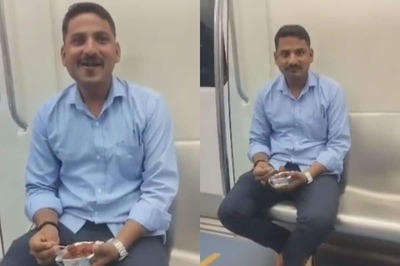




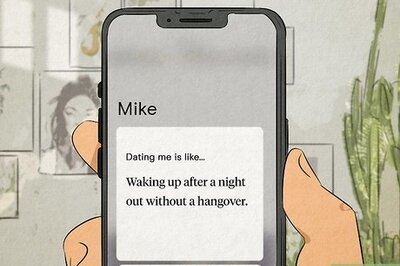
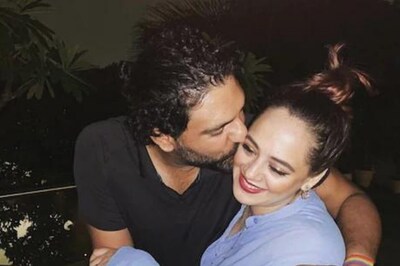

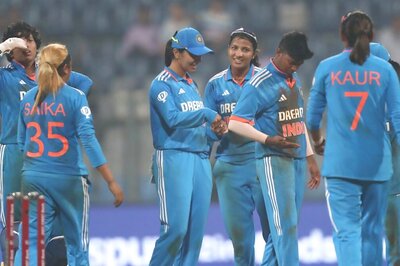

Comments
0 comment